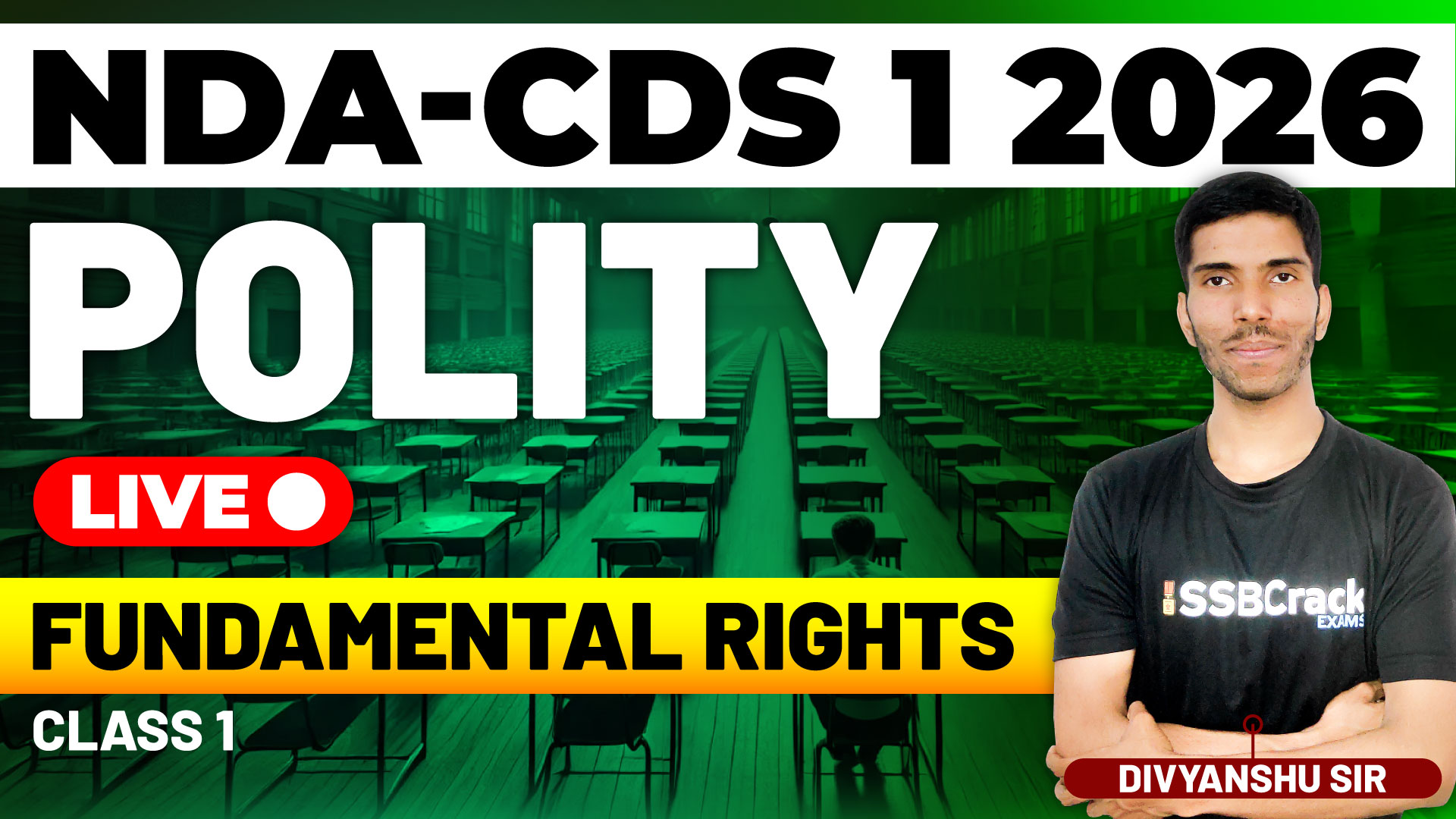The Fundamental Rights are one of the most important topics in Indian Polity for the NDA & CDS 2026 Examinations. They form the cornerstone of the Indian Constitution, ensuring that every citizen enjoys basic freedoms and equality. These rights protect individuals from arbitrary actions by the State and guarantee civil liberties essential for the development of a free and democratic society.
NDA & CDS 1 2026 Exam Polity – Fundamental Rights – Class 1
Origin and Significance
The concept of Fundamental Rights in India is inspired by the Bill of Rights of the United States and the Declaration of the Rights of Man of France.
They are incorporated in Part III (Articles 12 to 35) of the Indian Constitution and are often called the “Magna Carta of India”, symbolizing the foundation of citizens’ rights and liberties.
Fundamental Rights promote political democracy in India by limiting the powers of the government and empowering citizens to live with dignity and freedom.
List of Fundamental Rights
There are six Fundamental Rights guaranteed by the Constitution of India:
1. Right to Equality (Articles 14–18)
- Ensures equality before law and equal protection of laws (Article 14).
- Prohibits discrimination on grounds of religion, race, caste, sex, or place of birth (Article 15).
- Provides equality of opportunity in matters of public employment (Article 16).
- Abolishes untouchability (Article 17).
- Abolishes titles except military and academic distinctions (Article 18).
2. Right to Freedom (Articles 19–22)
- Guarantees six fundamental freedoms (Article 19):
- Freedom of speech and expression
- Freedom to assemble peacefully without arms
- Freedom to form associations or unions
- Freedom to move freely throughout India
- Freedom to reside and settle anywhere in India
- Freedom to practice any profession or trade
- Protection in respect of conviction for offences (Article 20).
- Protection of life and personal liberty (Article 21).
- Right to education for children aged 6–14 years (Article 21A).
- Protection against arbitrary arrest and detention (Article 22).
3. Right against Exploitation (Articles 23–24)
- Prohibits human trafficking, forced labour, and begar (Article 23).
- Prohibits employment of children below 14 years in hazardous industries (Article 24).
4. Right to Freedom of Religion (Articles 25–28)
- Ensures freedom of conscience and free profession, practice, and propagation of religion (Article 25).
- Allows freedom to manage religious affairs (Article 26).
- Provides freedom from paying taxes for promoting any religion (Article 27).
- Permits freedom from religious instruction in certain educational institutions (Article 28).
5. Cultural and Educational Rights (Articles 29–30)
- Protects interests of minorities by allowing them to conserve their culture, language, and script (Article 29).
- Grants minorities the right to establish and administer educational institutions (Article 30).
6. Right to Constitutional Remedies (Article 32)
- Described by Dr. B.R. Ambedkar as the “heart and soul of the Constitution”.
- Empowers citizens to approach the Supreme Court or High Courts for enforcement of Fundamental Rights through writs like:
- Habeas Corpus
- Mandamus
- Prohibition
- Certiorari
- Quo Warranto
Fundamental Rights Available Only to Citizens
Certain rights are exclusively for Indian citizens, such as:
- Article 15 and 16 (Right to equality)
- Article 19 (Right to freedom)
- Article 29 and 30 (Cultural and educational rights)
Reasonable Restrictions
Fundamental Rights are not absolute. The State can impose reasonable restrictions in the interest of public order, morality, and national security to maintain a balance between individual liberty and social order.
Suspension of Fundamental Rights
During a National Emergency (Article 352), Fundamental Rights under Articles 19 can be suspended.
However, Articles 20 and 21 cannot be suspended even during an emergency (as per the 44th Amendment Act, 1978).
Important Amendments and Cases
- Kesavananda Bharati Case (1973): Established the Basic Structure Doctrine; Fundamental Rights are part of the basic structure.
- Maneka Gandhi Case (1978): Expanded the meaning of Article 21 to include the Right to Live with Dignity.
- 44th Amendment Act (1978): Strengthened Fundamental Rights by limiting the power to suspend them.
Conclusion
The Fundamental Rights reflect the spirit of the Indian Constitution — freedom, equality, and justice. They safeguard individuals against arbitrary state action and lay the foundation of democracy in India. For NDA & CDS aspirants, a deep understanding of these rights, their scope, and landmark cases is essential for success in both exams and interviews.
Key Points for NDA & CDS 2026 Aspirants
- Fundamental Rights: Articles 12–35
- Introduced: Part III of the Constitution
- Number of Rights: Six
- Writs under Article 32: Five (Habeas Corpus, Mandamus, Prohibition, Certiorari, Quo Warranto)
- Not Suspended During Emergency: Articles 20 & 21







